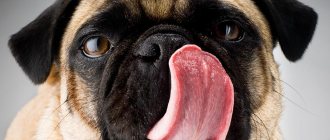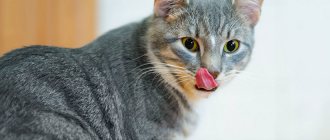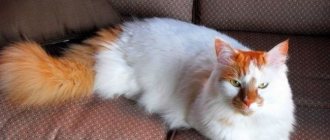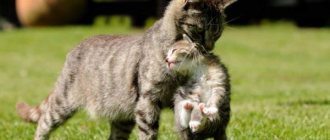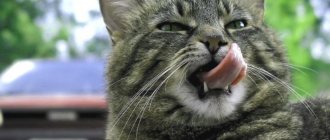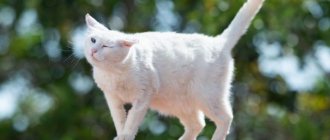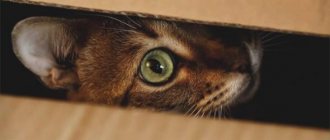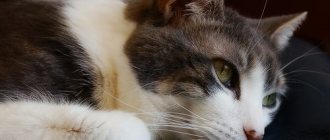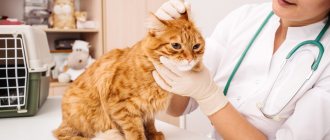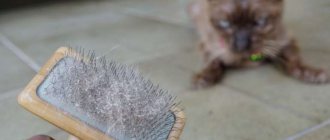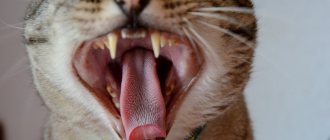10011Administration
Some owners find it very funny that their cat constantly licks itself. But there's not much fun in this. There are often cases where it is better to establish the exact reason for this behavior of your furry pet.
Cats lick their lips due to intense salivation. This does not mean that he is sick, but something is definitely bothering him, he is stressed or uncomfortable. In any case, if a cat constantly licks its lips, you need to observe it for several days and take into account other symptoms, manifestations and its behavior.
Reasons why a cat often licks its lips
Frequent licking in cats occurs due to copious saliva production and the need to swallow. This process is not a separate disease. Sometimes pet owners like that their pet licks itself frequently. However, frequent and large salivation may indicate abnormal health conditions.
Reflexes
Licking is a reflexive process inherent in cats by nature, regardless of breed or lifestyle.
Animals run their tongues over their noses for various reasons:
- depending on the type of food - until it is served or the animal perceives an appetizing aroma;
- during sleep , during which the nose dries out and becomes warm;
- desire to drink water - during hot weather, when feeding dry food. The pet should always have access to fresh, clean water in large quantities;
- stressful situation - in this way the pet calms itself, and also washes away unpleasant odors from its fur.
A cat may lick its lips when it sees food or wants to drink.
Nervous tension
Overexcitement, a situation of danger, the washing process, the period of estrus, negative or positive emotions are the causes of nervous tension and stress in a pet. By licking they bring their mental state back to normal.
Nausea
There is a theory that the bactericidal and lubricating properties of saliva help eliminate the urge to vomit, making it easier for processed foods to move down the larynx during vomiting to prevent cutting off oxygen to the lungs.
Claustrophobia
Claustrophobia is the fear of enclosed spaces. As much as cats love boxes, houses and other containers, they are afraid of closed spaces. When a pet does not see an open exit from a room or other room, it experiences severe stress.
In the process of nervous tension, the body works on reflexes, as a result of which hypersalivation occurs, which the animal tries to eliminate by licking.
Overgrooming
The cat performs this action for several reasons:
- Diseases of the skin and its derivatives;
- Frequent exposure to stress;
- Unsanitary conditions in the pet's place of residence.
Frequent licking leads to a change in behavior, as a result of which overgrooming becomes a bad habit. The animal's body begins to produce abundant saliva, as a result of which it constantly licks itself. This behavior of a cat is corrected with great difficulty.
Worms
Infection of a pet with helminthiasis causes itching. By scratching these places, the pet injures itself. As a result, he tries to lick the wounds. For this process, the body increases salivation, as a result of which the cat begins to lick its nose and lick itself frequently.
Conditions for which increased salivation is normal
There are situations in which increased salivation is a physiological norm:
- in temperamental cats, drooling can be caused by communication with their beloved owner, for example, in Sphynxes;
- when expecting food, as well as from its sight and smell;
- under stress - and its source may not be obvious to the owner (the appearance of a new person or animal in the environment, a change in the environment, a visit to the veterinary clinic), while the cat will nervously lick itself, over time, as the cat gets used to the changes, drooling goes away;
- if a cat takes tablet medications, their bitter taste and unpleasant aftertaste can increase saliva production;
- when foreign bodies or large pieces of food get stuck in the cat’s mouth, the cat may become restless and try to help itself with its paws;
- during teething in growing cats in the period from 3 to 6 months;
Hypersalivation during the period of teeth change in kittens is considered normal.
Video: causes of drooling in cats
When to contact a veterinarian
You should contact a veterinary clinic after analyzing the cat’s behavior. If the owner notices unnaturally frequent licking, then a consultation with a veterinarian should not be postponed.
You will also need medical advice if:
- The cat stopped drinking water . In this case, you should contact the clinic immediately, since dehydration will lead to serious consequences and death;
- , partial or complete baldness occurs . This fact is a sign of many skin diseases, and is also present about skin and fur parasites in a pet;
- Allergy symptoms appear , such as redness, burning and hypersalivation. Allergic irritations can lead to serious illnesses, asphyxia, suppuration, blood poisoning and other sad consequences;
- The pet feels sick and vomits . Nausea is a sign of diseases varying in severity. These diseases can be poisoning of any nature, dysfunction of the kidneys, liver and genitourinary system;
- The habits and habits of the animal have changed . A drastic change in a cat's behavior indicates the presence of serious nervous diseases.
Symptomatic treatment
You need to start by finding out the causes of the phenomenon. If these are medical problems, then they need to be addressed with the help of a veterinarian. You should consult a doctor if your animal regurgitates hairballs too often, licks itself until bald patches form, and various rashes and scratches appear on the skin.
The veterinarian will assess the cat’s condition and conduct the necessary examinations. For example, in case of receding hairline and scratching until it bleeds, a specialist will definitely do a scraping and take a blood and urine test. If internal pathologies are suspected, the specialist will conduct an ultrasound and computed tomography.
Once the diagnosis is made, the veterinarian will prescribe treatment. If you strictly follow all the veterinarian’s recommendations, then recovery will come quickly, and intense licking will pass.
Why do cats lick themselves?
The reasons why these animals lick themselves all the time are not always as harmless as they seem. Sometimes such licking indicates illness. To understand that it is time to sound the alarm, the owner of such a pet should know why the cat licks itself all the time, paying special attention to certain areas of the body, for example, the area near the anus or nose.
Hygiene, grooming
After contact with other animals and people, cats tidy up their fur. During the washing process, the pet is relaxed and completely focused on the cleanliness of its coat. When washing, he does not focus on one part of the body, paying equal attention to the tail, paws and muzzle. Usually, after the procedure is completed, the animal quietly dozes.
Self-soothing, stress relief
Cats are very vulnerable animals. Any event, be it a change of residence, a trip to the veterinary clinic, family quarrels, the arrival of a new pet in the house or rough treatment, can cause stress in them. Some cats, experiencing strong emotional stress, begin to actively lick their lips. Why do they do this and how does it relate to negative emotions?
Some people, when worried or nervous, bite their nails or bite their lips. Cats lick themselves. So both of them try to protect themselves from an unpleasant situation, transferring the reaction from an inaccessible object or action that they cannot influence to an accessible one.
Trying to get rid of skin parasites
If your pet constantly licks itself and shakes its head, creating the feeling that it is gnawing something out of its fur, most likely it is tormented by skin parasites: fleas, lice eaters, ticks. An animal infected with ectoparasites becomes restless and lethargic, sleeps and eats poorly, and the condition of its coat deteriorates. It is wrong to think that outdoor pests can only affect stray cats or those who are often outdoors. Any pet, no matter how well-groomed it may be, can pick up fleas or ticks simply by rubbing against the owner’s leg after returning from a walk.
Skin itching due to allergies, fungal infections, metabolic disorders
Your pet may constantly lick itself to relieve itchy skin, which is caused by:
- allergic reaction to food, dust, pollen of flowering plants, medications, etc.;
- skin lesions due to fungal infection;
- metabolic disorders.
Allergies do not pose a danger to a cat if treatment is started in a timely manner. Usually it is enough to exclude your pet from contact with the allergen, and the symptoms of an allergic reaction will disappear. A fungal infection can be easily recognized by a number of signs:
- baldness of certain parts of the cat’s body;
- bloody sores covered with scabs;
- dryness, peeling, redness or, on the contrary, pallor of the affected skin.
Itching in the anus due to worms
If your pet is licking under its tail, this may indicate that it has worms. Some types of helminths cause itching in the anus, causing the animal to become restless, sleep poorly and eat poorly. The cat owner needs to examine the contents of the cat's litter box. When a pet is infected with helminthiasis, parasites can be found in its feces. Ignoring the symptoms of this disease can have serious consequences for your cat's health.
Inflammation of the paraanal glands
Why does an animal lick its anus, ride its butt and chew its tail? This behavior may be caused by inflammation of the paraanal glands, which are located on both sides of the anus and serve to produce a special odorous substance necessary for contact with fellow animals. Sometimes these glands become clogged and inflamed, causing significant discomfort to their owner. This usually occurs due to frequent constipation and decreased muscle tone.
Animals over 4 years of age are most susceptible to this disease. The inflammatory process cannot be ignored, as it can lead to blood poisoning, and in especially severe cases, to the death of the cat.
Cats in heat
If your pet has a clear, odorless discharge, she raises her pelvis, throws her tail to the side and actively licks her genitals, it means she is in heat. During the estrous cycle, a cat may compulsively show her genitals to members of the household. If her behavior is ignored, she turns her attention to inanimate objects: a scratching post, corners, doorways.
Etiology
Pharyngeal dysphagia in dogs and cats occurs primarily as an acquired disorder due to neuropathy, myopathy, and synaptic dysfunction (for example, localized myasthenia gravis). Failure to form a normal food bolus at the base of the tongue and/or to push the bolus into the esophagus is often associated with damage to cranial nerves IX or X. Concurrent dysfunction of the cranial esophagus can result in food retention just behind the cricopharyngeal sphincter.
We recommend reading: Cat Eyes Fester
In what cases is it necessary to consult a veterinarian?
If there are some accompanying symptoms, an animal actively licking itself or licking its nose should be shown to a veterinarian. The following signs should not be ignored:
- lethargy and lack of response to external stimuli;
- decrease in physical activity;
- increased body temperature;
- complete or partial loss of interest in food and, accordingly, weight loss;
- deterioration of the coat (thinning or hair loss);
- the appearance of sores and scabs on the skin;
- increased thirst;
- disruption of the digestion process and bowel movements;
- refusal of water;
- signs of intoxication and dehydration of the body;
- frequent vomiting.
You should not treat the animal yourself. Inept actions can aggravate the problem, so it is better to entrust the identification of the cause of the disease and the development of a treatment regimen to a veterinarian.
Diseases of internal organs
Increased salivation may be a sign of some diseases of the animal’s internal organs:
Most pathologies of internal organs in the initial stages of development are asymptomatic.
The first signs appear only as the disease progresses. Accordingly, not every owner will be able to independently determine the disease. Therefore, the diagnosis should be carried out by a veterinarian.
If the animal’s condition is too serious, it cannot be postponed; you must immediately contact the clinic for examination. Timely diagnosis will allow you to quickly get rid of the disease and prevent it from becoming chronic.
Causes of licking and swallowing saliva
As you know, cats sleep most of the time. The active life of an animal is measured approximately 4-6 hours a day. If 30-40% of this time she is engaged in hygiene procedures, then you can be calm, but if the cat licks itself all the time without stopping, then you need to sound the alarm.
The pet often licks itself for no apparent reason
The reasons may be the following.
Nervousness
One of the most common reasons is nervousness. When you live with a pet for more than one year, you can easily notice when it is stressed or tense. This condition is immediately revealed by the eyes and behavior.
In such situations, the cat often licks itself, because this process contributes to the production of a pleasure hormone. The source of increased nervousness of the animal can be a change of food, a change of place of residence, the appearance of new residents, and even a change of filler in the tray.
Attention! The most common sign of stress is the constant twitching of the tip of the tail.
Reflexes
A cat licks on an instinctive level. That is, it is such a reflex.
To avoid paranoia, it is worth clarifying when it is normal for an animal to lick itself:
- After eating and sleeping, licking yourself is a common thing;
- when food is placed in a bowl;
- when the animal wants to drink (if water is freely available, then this is no longer normal);
- when the house is too hot and the cat’s nose is dry, even while sleeping, licking the dry nose a couple of times is in order.
Often a cat will lick its lips after being petted or cuddled by children. Animals do not like foreign smells on their fur, so they try to eliminate it with this procedure.
Attacks of nausea
If your cat constantly swallows saliva and licks his lips, limiting himself only to his face and not his entire body, this may be a sign of nausea.
An example of what ulcerative wounds in a cat's mouth might look like
In this case, you need to watch the animal. See how the cat eats, whether he eats food at all, whether he drinks enough, look around the apartment for signs of regurgitation of fur.
You should also pay attention to your pet's stool. Attacks of nausea are a common sign of diseases in the gastrointestinal tract, the presence of worms, ingestion of foreign objects, and even vascular diseases.
Kidney pathology
If your cat starts licking itself frequently, there may be something wrong with its kidneys.
It is worth noting that the kidneys are the most vulnerable place of most animals, so this is worth paying attention to first. Disturbance in the functioning of these organs can be identified by related signs: loss of appetite, lethargic appearance, weight loss, frequent trips to the toilet in small quantities, the nose and gums turn pale, there are ulcerative wounds in the mouth, burst capillaries in the eyes.
And others
In general, if a cat begins to constantly lick itself, you will most likely have to contact a veterinarian, because in addition to the above reasons, you can additionally voice:
- Poisoning. A poisoned mouse, low-quality food, chemicals stored in places accessible to the cat - all this can cause poisoning and, as a result, the animal begins to drool, eats little, and experiences weakness and lethargy. Sometimes a kitten can lie for a long time without moving, and additionally suffer from nausea, loose stools and high fever, from which the cat can even shake.
- Dental problems. This pet anxiety is quite difficult to identify. Usually, problems with teeth can occur after the age of 5 and, apart from an unpleasant odor from the mouth, no other symptoms are observed.
- Allergies and internal diseases. Often, allergies in animals are accompanied by itching. Because of this, increased salivation occurs, they sleep little, are active a lot and lick themselves with great enthusiasm in the hope of relieving the itching. It is quite difficult to identify an allergen or the presence of a disease that causes an itchy effect. In most cases, it is worth paying attention to a change in food, place of residence (for example, moving to a country house), and new household items (scratching posts often contain toxic materials).
- Claustrophobia. A very rare occurrence, especially for domestic cats, but such cases have also occurred. A closed space provokes the same nervousness and stress.
- Parasites. A very common reason, especially if your pet’s diet includes raw fish and meat. Signs of parasite infection, in addition to licking, are biting, scratching up to open wounds, the presence of nits, worms, itching in the anal area and, most characteristically, foam in the mouth.
Consequences of self-medication
At home it is impossible to identify the cause of ptyalism, and without an accurate diagnosis it is impossible to cope with the underlying disease.
Losing time can lead to complications, including the death of your pet:
- Rabies cannot be treated; if infection is suspected, the cat is isolated and changes in health are monitored. If this is not done on time, the virus is transmitted to others through the bites of a sick animal. A person can only be saved by a course of injections of an anti-rabies vaccine to produce antibodies to the virus. Delay with injections leads to death.
- For calcivirus infection, a complex of drugs will be required. The disease goes away in 7–10 days if it is diagnosed in time and treatment is started. In the advanced stage, secondary infections occur and pneumonia develops.
- When an object gets into the throat, the pet's larynx suffocates. They urgently take the cat to the clinic and do not try to remove it themselves. A foreign body in the stomach or intestines causes tissue necrosis, mucosal ruptures, and obstruction. It is detected using x-rays or ultrasound and can only be removed surgically.
- Severe forms of chemical burns cause toxic shock and impair respiratory function. Without emergency assistance, suffocation occurs and the animal dies.
- Inflammatory diseases of the gastrointestinal tract do not go away without medications and a therapeutic diet; they exhaust the cat and shorten its life. Drugs are prescribed only after identifying the cause of inflammation and making a diagnosis.
- Gingivitis and stomatitis without proper treatment become chronic, when inflammation begins from the slightest irritant and is not completely cured. The animal experiences constant pain, and because of this, its character deteriorates. With chronic gingivitis, diseased teeth have to be removed.
- When poisoned, a cat loses fluid, and in severe cases, dehydration occurs. Due to the wrong choice of medications, intoxication increases, the gastric mucosa becomes inflamed, bleeding begins, and toxins affect internal organs.
Increased salivary secretion in cats cannot be considered a harmless symptom. This phenomenon accompanies a lot of pathologies that cannot be dealt with without medical help.
How you can help your pet
A number of causes of excessive licking can be addressed on your own, but some can only be resolved with medical intervention.
So the pet owner will be able to cope with moral discomfort, claustrophobia, stress and nervousness on his own. It is enough to pay attention to the cat every day, to satisfy its hunting instinct (for example, with the same games with a string). When your pet has its own bed or platform, you can place it at a certain height.
For reference: cats love to occupy high places, which makes them feel safer.
If the symptoms are associated with a change of place of residence, it is important to provide the animal with a secluded place, hiding in which it can adapt to new conditions. If your cat has a competitor, it is important not to forget to pay attention to the animal.
An example of how an animal can foam at the mouth
Poisoning can be prevented by regular sanitization of the premises where the cat is. If poisons are used against insects or rodents, it is important to protect the animal from places where the poison is scattered.
To ensure that cats do not have digestive problems, have a strong immune system and healthy teeth, it is important that the pet receives all the important micro- and macroelements necessary for full development. To prevent kidney disease, it is advisable to eliminate drafts in the house.
Additional information: although excessive licking is quite common, many cats cope with the symptoms on their own, so visits to veterinary clinics mainly occur with serious symptoms that threaten the animal’s life.
Signs of poisoning
If, along with the flow of saliva and its constant swallowing, apathy, loss of appetite, and the urge to vomit are observed, there is a high probability of poisoning. Even at home, there are always dangerous substances that can accidentally enter the pet’s stomach.
Source of intoxication.
For cats that roam freely outside, the risks of poisoning are especially high. By nature they are predators. Therefore, even when well-fed, an active pet can catch a poisoned mouse. If the cat starts to chew it, it will receive a decent dose of the toxic substance along with the meat. Of course, the consequences will not be as severe as for a rodent, but the pet’s body weight is also not impressive.
Symptoms of poisoning. If intoxicated, the cat will experience:
- rise in body temperature more than +40°C;
- complete refusal to eat;
- lack of air, shortness of breath;
- pronounced weakness;
- accelerated heartbeat;
- internal bleeding;
- vomiting, diarrhea, cramps.
First aid and therapy. As first aid, you should try to give a potent sorbent, diluted with water to a liquid state. The solution should be poured into the cheek, firmly holding the pet's body and paws. The next step is to immediately contact a veterinary clinic. There they will be able to quickly carry out all procedures to remove most of the toxins and prescribe subsequent treatment with medications.
